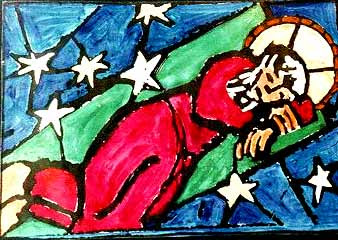Prayer is something I struggle with. Not
doing it, necessarily (although that's hard sometimes too) but just
defining it. What does it mean to pray? What's the point of prayer? How are prayers answered? Why are they left unanswered? So many questions.
Like many people, I was raised with the notion that God is an awful lot like Santa Claus - he sees you when you're sleeping, he knows when you're awake, he knows if you've been bad or good -
so be good, for goodness sake! And, if you're good
enough, then you'll be rewarded.
Once I realized that God wasn't going to grant me three wishes - no matter how "good" I try to be - I thought to myself, "Well, what's the point?" Honestly, what
is the point in praying for a sick person if they're not going to be healed?
Because we are fragile creatures with very breakable
hearts who need to commune with the Divine.
It'd be a sad, sad world if you never called your sister or best friend or uncle - except for when you needed money. Or when someone had died. Just like we need intimate relationships with human beings, we need that intimacy with God. And if you want to know someone, you're going to have to speak with him/her at some point.
The Catechism (I don't know why I don't read it more often - it's a wise little book) says:
Q. Why do we praise God?
A. We praise God, not to obtain anything, but because God's Being draws praise from us.
Oh, duh. I knew that.
Q. What is prayer?
A. Prayer is responding to God, by thought and by deeds, with or without words.
I find the most sincere and genuine form of prayer to be wordless, and often spontaneous. We respond to God in fear (too often, probably), in sorrow, in agony, in joy, and in love. And God hears us.
One of my favorite lines about God comes from the movie "What Dreams May Come." Robin Williams' character, after dying, asks his fellow departed friend where God is. His friend smiles, points to the sky and says, "Oh, he's up there somewhere - shouting down that he loves us, and wondering why we can't hear him."
Prayer, salvation, communion - all these are mysteries of God. They can't be put into a solvable formula. (If only it were so easy! "I do x, and God will do y.")
God's mysteries, in a sense, can only be deeply understood through the soul - not the brain, not the heart, not the body. They cannot be explained. That is terribly frustrating for us humans. We demand explanations for everything.
So, we continue to pray for the sick, the dying - those who suffer, including ourselves. Because prayer - communion with the sacred - is a healing act. It is, by nature, restorative.
Listen to this song, it's one of my new favorites:
Long walks in the dark through woods grown behind the park,
I asked God who I'm supposed to be.
The stars smiled down on me, God answered in silent reverie.
I said a prayer and fell asleep.












